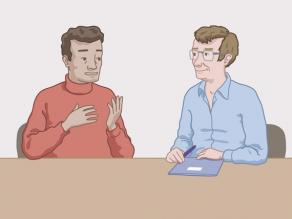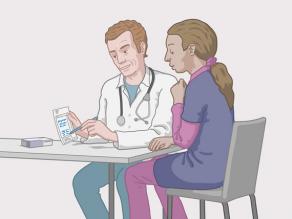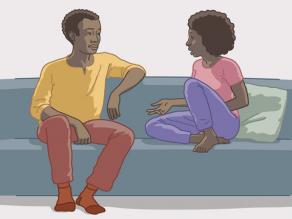STI treatment
If you think you may have an STI, ask a doctor for help. STIs should be treated to avoid negative effects on your health. Talk to a doctor so that he/she can give you the right treatment.
Follow the treatment in the way that the doctor tells you. Continue the treatment even when the symptoms have disappeared.
There are different types of STIs. These do not always have symptoms. Ask a doctor for advice. Every STI is treated differently.
Treatment for bacterial STIs
STIs caused by bacteria:
- chlamydia;
- gonorrhoea; and
- syphilis.
Bacterial STIs can be treated with antibiotics. You need a prescription from the doctor. Then you can buy the medicines from a pharmacy.
During treatment, avoid sex while you still have symptoms or use a condom to lower the risk of infecting someone else.
Treatment for viral STIs
STIs caused by a virus:
- HIV;
- hepatitis B;
- herpes; and
- genital warts.
Some viral STIs cannot be cured, but the symptoms can be treated.
- Hepatitis B: rest well. If necessary, the doctor can prescribe you medicines.
- Herpes: if necessary, the doctor can prescribe medicines for treating the blisters.
- Genital warts: the doctor can prescribe a cream to apply on the warts. If necessary, the doctor removes the warts by cutting them away or freezing them.
Treatment for parasitic STIs
STIs caused by a parasite:
- scabies;
- trichomoniasis; and
- pubic lice.
Scabies:
- The doctor can prescribe a cream to apply on your skin.
- Wash your underwear, clothes, pyjamas, bed linen and towels every day at a temperature of at least 60° C.
Trichomoniasis:
- Can be treated with antibiotics.
- You need a prescription from a doctor to get the medicines.
Pubic lice:
- The doctor can prescribe a cream to apply on your skin where you have lice.
- Wash your underwear, clothes, pyjamas, bed linen and towels every day at a temperature of at least 60° C.
Talking with your partner
If you have an STI talk to your partner about it and encourage him/her to go to a doctor. If you have certain STIs, your partner needs to be tested and treated as well. You protect yourself this way too. If your partner is not treated, you can become infected again if you have sex without a condom.
Do not have sex during your treatment or use a condom to lower the risk of infecting your partner.
If you have recently had sex with another person, warn him or her too. Then this person can also get tested and treated.
Ask a doctor for advice.



